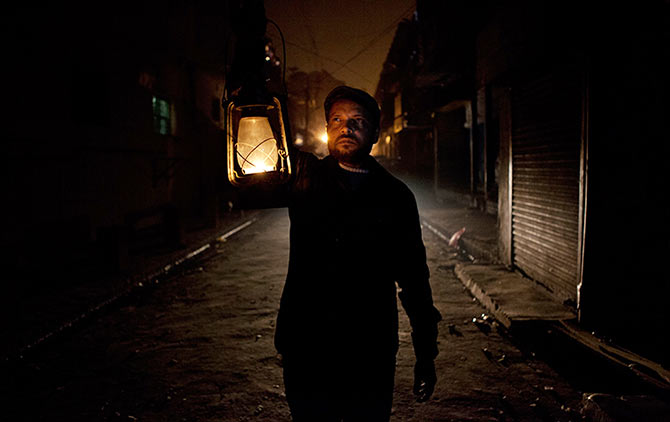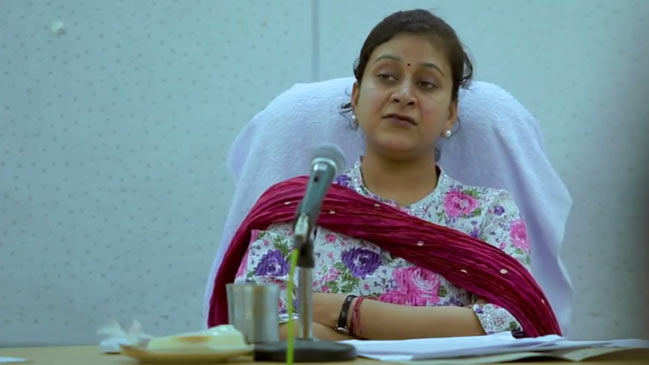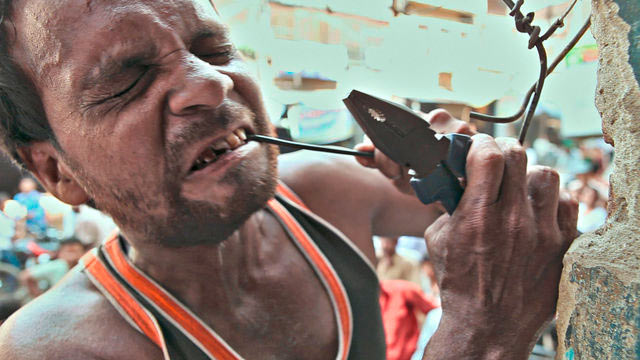Aseem Chhabra/Rediff.com
Katiyabaaz captures the electricity crisis in an Indian city. Filmmakers Fahad Mustafa and Deepti Kakkar tell Aseem Chhabra/Rediff.com what went into making their powerful documentary, which releases on Friday, August 22.
Once called the Manchester of the East, Kanpur boasted of India's major cotton and woollen cloth mills.
Now, the city of 3 million people, and the leather capital of India -- supplying to Western brands like Gucci, Levis and Mango -- is better known for its huge electricity crisis.
Kanpur is the subject of a powerful, engaging, and at times hilarious documentary called Katiyabaaz, an exploration of the electricity crisis in the city.
Delhi-based filmmakers Fahad Mustafa and Deepti Kakkar premiered the documentary at the Berlin Film Festival.
As the filmmakers state in the film, 1.5 billion people live without electricity in the world. More than 400 million of those are in India.
In Katiyabaaz, they explore how Kanpur residents (or for that matter elsewhere in India) survive long hours -- sometimes 15 or more at a stretch -- of power cuts, using small generators and stealing electricity from neighbours. The latter strategy uses specialists, essentially electricity thieves who are referred to as katiyabaaz in the city.
Partially funded by the Sundance Institute and Documentary Fund, Katiyabaaz also uses the young film talent of Mumbai.
Varun Grover, who wrote some amazing lyrics for Anurag Kashyap's That Girl In Yellow Boots and Gangs Of Wasseypur, wrote the main song for Katiyabaaz. Namrata Rao is the film's co-editor; her Bollywood editing credits include Jab Tak Hai Jaan, Shanghai, Kahaani and Ishqiya.
I have seen power cuts in Delhi, but I had never witnessed something of this magnitude and the reactions such as riots...
Fahad Mustafa: It is pretty common in the summers in Kanpur. People riot, get beaten up, killed.
Kanpur has become particularly orphaned because of the politics of the city. It often elects Congress party or Communists as MLAs (members of the legislative assembly) because of the mills.
Deepti Kakkar: I don't think it is specific to Kanpur, although the city has a unique character. It's a city of mills and immigrants. When the mills shut down, in one fell stroke thousands of people lost their jobs.
All of these things contributed to the sense of chaos and crisis. But I am sure it happens elsewhere too. It happens in Ghaziabad.
...
'For the power cuts, we sometimes waited five to six hours'
Image: Loha Singh in Katiyabaaz.Aseem Chhabra/Rediff.com
Did you wait for a riot to happen to show it in the film?
Deepti Kakkar: We actually waited for the Rapid Action Force to enter a neighborhood. Because there are sometimes mobs of 500 plus people and the administration is afraid of going inside these areas. We were waiting to capture that on screen, but it didn't happen, which is a good thing.
There are many shots of the brightly lit city and then it goes dark. How long did you have to wait to capture those shots?
Fahad Mustafa: For the power cuts, we sometimes waited five to six hours. We would have two cameras running.
DK: And the crew hates us for that (laughs).
Then you capture some remarkable scenes of the transformers burning in the middle of the day. How did you manage to get to the right place every time?
DK: We had a network of people who would call us anytime something was starting to happen... But we had to be there at that instant and there were a few occasions we managed to be at the right spot.
We missed it more time than we actually filmed it.
...
'There has been no new power plant in Uttar Pradesh in 22 years'
Image: Ritu Maheshwari in Katiyabaaz.Aseem Chhabra/Rediff.com
You have three main characters -- Loha Singh, a katiyabaaz; a local MLA and IAS officer Ritu Maheshwari, the first lady chief of the Kanpur Electricity Supply Company. What did it take for you to get them to speak so honestly?
Fahad Mustafa: It was not easy for her. She is an IAS officer and we had to work very hard to get permission to shoot with her, also to get her to be outside this official space. Usually it would be like, 'I will give you an interview in my official capacity.'
To break that down took about a year.
Also with Loha Singh, (a 28-year-old Robin Hood-like figure who steals electricity from rich customers and neighbourhoods for poorer folk) the first interview we did with him, he seems to be sitting very confidently, but he is also shaking. It took a lot of working with him.
What did you think of the IAS officer? It seems she was trying to make a difference...
Deepti Kakkar: I think she was fighting something that is much bigger than her. She actually did not have any political affiliations. She tries hard to stay out of the political games. So, she has been transferred twice since Kanpur.
Did you time the shoot to capture the mood of the UP elections?
FM: No, it was something we discovered while making the film. We were concerned since our permissions were from the previous administration.
How do you get out of this state of affairs?
FM: Something has to be done. There has been no new power plant in the state (Uttar Pradesh) in 22 years.
...
'Building infrastructure should be the government's responsibility'
Image: Loha Singh in Katiyabaaz.Aseem Chhabra/Rediff.com
What about privatisation of electricity production and supply?
Deepti Kakkar: They have actually flirted with the privatisation idea in Kanpur, looking at Agra as an example. But it didn't go so well.
There is privatisation in big cities -- Mumbai, Delhi. But there is a lot of pressure from the unions. They do not want it to happen. At any rate, they would give away the rights for supply of electricity, not production.
Fahad Mustafa: It is strange that in something like this you assume privatisation is the answer.
The government has to take responsibility. Building infrastructure should be the government's responsibility.
You made the statement at the end about the big power outage that impacted nearly half of India, and also that there is not much of a market for documentaries in India. What do you hope for this film in India?
FM: We hope we can take it to a lot of places. I know it is a little bit of gamble on our part to push it so much in India. But this is something we really want to do, simply because documentaries need to be seen in India.
When filmmakers decide to make a documentary, there is hope that this will cause change or, at the very least, bring about awareness.
But in our country the unfortunate thing is that documentaries go on national television, in which case they are heavily censored or they go to foreign broadcasts.





Comment
article